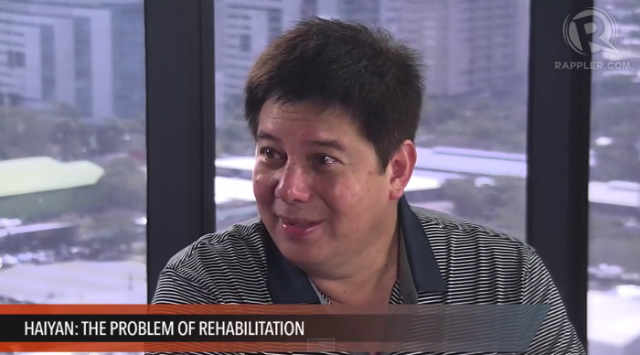SUMMARY
This is AI generated summarization, which may have errors. For context, always refer to the full article.

MANILA, Philippines – Citing red tape and incompetence in the national government, Tacloban Mayor Alfred Romualdez said “emphasis should be made” on holding the Cabinet accountable for the delay in rehabilitation efforts after Super Typhoon Yolanda (Haiyan).
Referring to the Cabinet, Romualdez told Rappler, “The buck should stop there.”
In an interview on Monday, May 12, he said a basic problem begins with the Department of Budget and Management (DBM), the department he counts on the most in rehabilitation efforts.
He stressed the need for the DBM to promptly release funds to other departments, which will then use the money to help Yolanda survivors. “Eh kung hindi pondohan ng DBM ang department, ano,ng magagawa ng department?” (If the DBM doesn’t fund the department, what can the department do?)
Romualdez raised this issue 6 months after Yolanda, on November 8, 2013, killed more than 6,000 people and affected 16 million, mostly in his province of Leyte.
(Watch the full Rappler interview below)
Oxfam, an international aid group, made a similar observation: Money is not reaching local government units (LGUs) in Yolanda-affected communities.
Budget Secretary Butch Abad, for his part, said the DBM “would like very much to accelerate the release of funds for rehabilitation, if possible within the first semester.”
He said the DBM releases most funds through agencies, such as the Department of Social Welfare and Development (DSWD), the Department of Education, the Department of Health, and the Department of Public Works and Highways. He said the DBM released funds to these agencies “as early as late last year.”
He added the DBM “will also prefer releasing funds” to LGUs for projects they can undertake.
“The problem with some LGUs is capacity, not just to implement but even more basically to prepare plans, feasibility studies, programs of work, and monitoring and reporting systems,” Abad said in a text message to Rappler.
Oxfam’s humanitarian programme manager Tariq Riebl said otherwise on Thursday: “Even if the capacity is there, the money didn’t come down to the field level and then at some point, LGUs had to turn to NGOs, the Red Cross, private sector to do the assistance because it just didn’t have the budget for it.”
‘Worse than politics’
The challenge, however, doesn’t end with funds. During Monday’s interview, Romualdez said another hurdle involves “the coordination and the verification of facts.” (Watch more in the video below.)
He recalled a report by the DSWD that said Tacloban has 12,000 damaged houses, while the town of Palo, also in Leyte, has 14,000.
Romualdez questioned these figures considering that Tacloban – the local government unit (LGU) worst hit by Yolanda – has a population of 240,000. Palo, on the other hand, has around 62,700, according to government statistics.
He asked, “Paano nangyari ‘yun na mas maraming total damaged houses sa isang municipality kaysa sa Tacloban?” (How did it happen that a municipality had more damaged houses than in Tacloban?)
Did politics come into play, especially because the mayor of Palo, Remedios Petilla, is an ally of President Benigno Aquino III and in fact the mother of Energy Secretary Jericho Petilla?
When asked about this, Romualdez said: “I think it’s worse than politics, eh. It’s incompetence.”
He said it’s incompetence on the part “of the line agencies in charge of that.”
“You have to verify your information, that’s important. Because based on your information, they’ll use that to get funding. If there is fraud there, then there is a problem now there,” Romualdez said.
Basic problem: Red tape
Such incompetence affects the Palace, Romualdez said.
“So kawawa naman ‘yung Malacañang, nasasabit tuloy. ‘Napulitika kayo,’ pero sa totoo lang mali naman ‘yan,” he said. (Poor Malacañang, it gets implicated. ‘You’ve been politicized,’ when in fact it’s simply a mistake.)
Romualdez said this after Rehabilitation Secretary Panfilo Lacson, in a separate interview with Rappler, described up to 3 Cabinet secretaries as “incorrigibly uncooperative.”
For Romualdez, Lacson’s problem points to a basic cause of delay: red tape.
“I hope they can resolve that,” Romualdez said of Lacson’s complaint, as he added “we also have to look beyond that.”
He mentioned the need of the Office of Civil Defense (OCD) for “enough resources,” such as engineers, to craft a master rehabilitation plan for Yolanda survivors. “Do they have the capability? They should be supported,” Romualdez said, suggesting that the OCD “be allowed to temporarily borrow people” from the Department of Public Works and Highways, for instance, to do all these.
Ateneo School of Government Dean Tony La Viña, for his part, pointed to a basic problem derailing rehabilitation efforts: a system “designed to fail for massive disasters.”
For Lacson, the system involves too much bureaucracy. His lack of authority worsens this. – Rappler.com
Add a comment
How does this make you feel?
There are no comments yet. Add your comment to start the conversation.